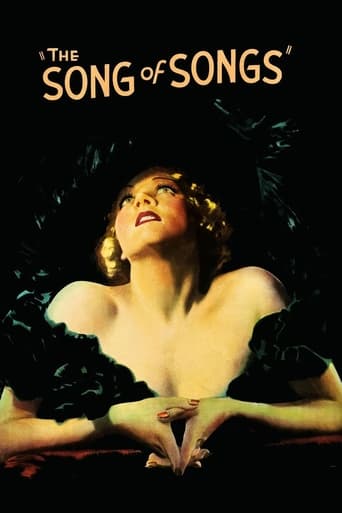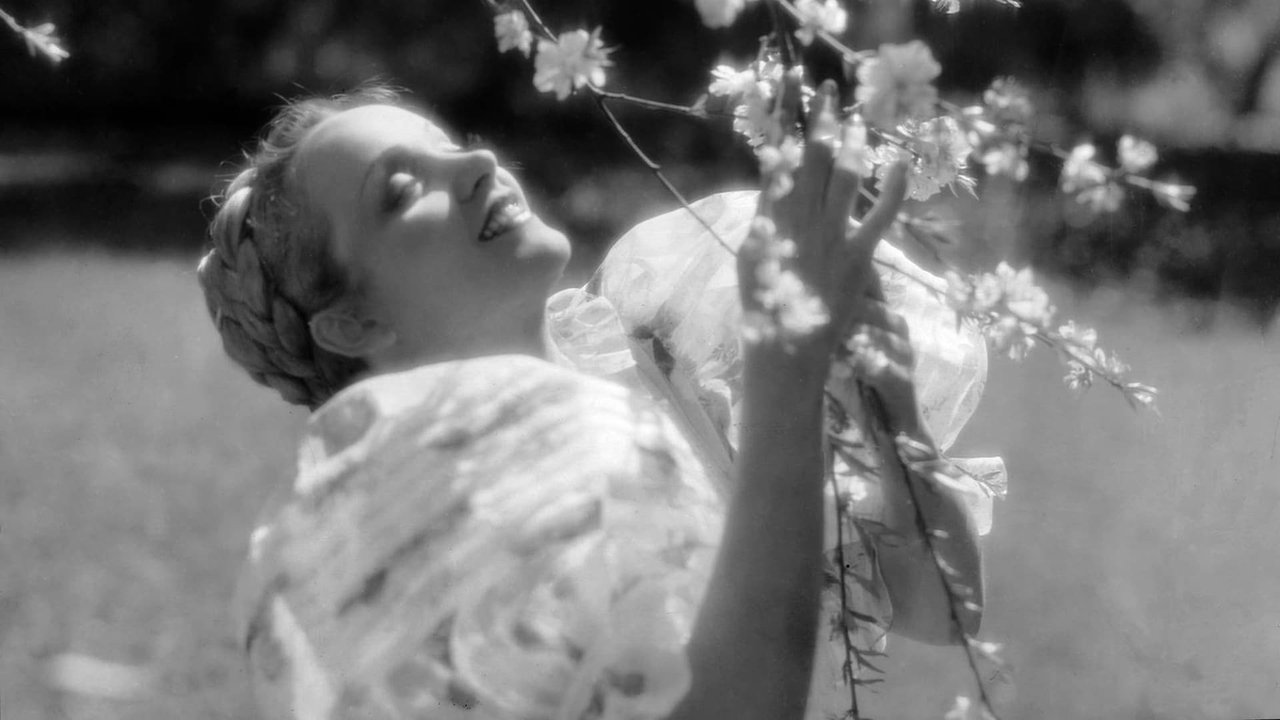edwagreen
Made in 1933 and Dietrich going nude to pose for a sculpture in this very good film.As her aunt, Alison Skipworth stole every scene she was in pretending to be so ethical, but winding up doing just about anything for liquor and a couple of bucks.Brian Ahearne is excellent as the sculptor who loves Dietrich, but is hesitant when it comes to marriage. Confused, he gives or consents to have Dietrich go with the elderly baron who she marries. He makes her into a charmed lady, but she is unhappy and caught escaping from a fire in the riding teacher's house, she becomes a wayward woman.Surprisingly there is no violence in the film where you would think there would be. The unexpected rather happy ending to all this was really surprising and well appreciated.Dietrich goes from a shy girl to quite a temptress in this worthwhile film.
Marcin Kukuczka
"Let him kiss me with the kisses of his mouth; for your love is better than wine." Song of Songs 1:2 While in the times of laws and restrictions, Israel was granted Solomon and his poetical spirit of wisdom, in the early years of cinema, Hollywood was granted Rouben Mamoulian (1897-1987) who brought a soul to his motion pictures. At the beginning, I would like to quote his very symbolic statement that defines Mamoulian's exceptional perspective on cinema (from "Directing the Film" by Eric Sherman, 1976). The innovative director said: "...the arts are the true universal medium. The whole thing should serve to remind you that man still has a potential, that he's not just crawling on earth. He still has wings and he can fly. We need this reminder of faith, of optimism, to reestablish the dignity of a human being." When we analyze his movies, particularly the two he made in 1933 with two greatest stars of cinema, Greta Garbo and Marlene Dietrich, we realize that there is something unique in the direction, in handling of the plots, in imagery and in the whole approach. The director has a great degree of love and respect towards his female stars and allows them to go beyond themselves in every respect. While "Queen Christina" clearly appears to be a Garbo film, "The Song of Songs" appears to be a Dietrich film. Why? The whole story of THE SONG OF SONGS occurs to deal with the life journey of the main character, Lily Czepanek (Marlene Dietrich). After the death of her father, a peasant girl, Lily, leaves for Berlin where she stays at her unemotional aunt, Mrs Ramussen (Alison Skipworth) who runs a bookshop. The thing she brings to Berlin and appreciates most is the Bible, particularly its Song of Songs praising the triumph of love. Soon, there appear two men in the life of the pure dove: one is the young sculptor Richard Waldow (Brian Atherne) who leads a life of an artist; the other is the rich, materialistic, conventional and heartless Baron Von Merzbach (Lionel Atwill) who has a power transform a shy girl into a sophisticated woman. Is there anyone on earth who can love her soul? Is there anyone whose heart is warm? Does she appear to be strong enough to defend her sweetest affection? Will she memorize the beautiful rhythm of the lovers' hearts? Marlene Dietrich portrays the character with unbelievable charm, flair, a bit of eroticism. She beautifully depicts a change of heart and many sophisticated feelings, including shyness, enthusiasm, sorrow, disillusion and coldness. She is given some of the most beautiful, poetical moments in the film, including the fabulous spring sequence which appears to be like a touch of southern breeze, like a magical journey into a lost paradise, like a gentle smile of a beauty that seems to overwhelm and supply us with the glimpse of bliss. Marlene is also unforgettable with her eyes and the whole posture when Richard tells her to take her clothes off and... Another moment that is hard to skip is when she, having gone through all this experience, enters Richard's room and sees the sculpture...her face is illuminated by memories, by longing, by sorrow rooted in a loss. A key moment is also her song "Johnny, when will your birthday be" Marlene sings it memorably and wears a gorgeous costume by Travis Benton. But here, there is a need to compare...Mamoulian appears to be creative when dealing with both Greta Garbo and Marlene Dietrich. The both are given the most sensitive moments in their careers and, although the two 1933 plots have little in common, there appear to be huge similarities. Mamoulian brings out something unique from his stars' depths: all the beauty, all the talent to raise and overwhelm. While Ms Garbo hugs the pillows in the inn where she has experienced love and touches the objects to memorize the room, Ms Dietrich touches the soil and kisses the grass. While Ms Garbo is a beauty, a queen of snow, Ms Dietrich is a pleasure, a girl of spring.Other cast give more or less decent performances. Lionel Atwill nicely portrays the cold baron, who is a representation of riches and conventions that have little to do with genuine love. He lusts for the innocent dove in order to take advantage of her and, finally, deprive her of dreams and illusions. He is the one who lustfully smokes a cigar when looking at the drafts of her body, his hand trembles and his smoke is on the painting. Brian Atherne is not particularly memorable as the sculptor Richard but he also has some of his good moments. Alison Skipworth has some witty moments as the conservative heartless auntie who does not tolerate much about the youth not being a saint herself...Another merit of the film are the unique close-ups of the sculptures. The images appear to speak with grandiosity of sculptures and sweetness of love song. The symbolic moment when Lily smashes the sculpture appears to depict the change that no longer allows to turn back.All in all, I have waited to see the film for a long time and...my patience was rewarded. I highly enjoyed it as a motion picture made so sensitively and poetically by Rouben Mamoulian. Don't ask me why...Perhaps, it is because of Marlene, perhaps, it is because of its beauty expressed in many scenes, perhaps, it is because of its great message: Be alert and don't skip an awakening love. Stop for a while and cherish the miracle of blossoming trees in spring and the joy of singing birds. This is a single gift and its bliss can never come again...I dedicate this review to my friend whose name is written in my heart. It is thanks to him I have seen this unforgettable film.
bkoganbing
The Song Of Songs was Marlene Dietrich's first American film without her German Svengali, Josef Von Sternberg. Maybe the German Von Sternberg might have been able to do something more with German author Hermann Sudermann's melodramatic plot. Something was terribly missing in the translation.When we first meet Dietrich she's an innocent country lass just lost both her parents come to live with her big city aunt, Alison Skipworth. Skipworth hasn't any great maternal feelings for her niece, but she does give her room and board and her job assisting at Skipworth's bookstore requires no great strain. In fact Marlene is a bright young woman and takes to the job.She gets a different job soon enough when sculptor Brian Aherne hires her as a model for a nude statue. Some of the nude sketches and the statue itself would not have made it in the film two years later when The Code was in place. She gets silly romantic notions about Aherne, but the guy whose mojo she gets going is Baron Lionel Atwill who's willing to marry her and does on the rebound.Of course that doesn't work out, for crying out loud it's Lionel Atwill she's marrying and who catches her with riding instructor Hardie Albright during a fire when both flee the scene. After that she becomes the Marlene whom we met in Shanghai Express, Shanghai Lily. Curiously enough Dietrich's character is Lily Czepanek.The film is carried by Dietrich on the strength of her performance, she transforms herself into several different characters, the country innocent, the degraded baroness, to the jaded woman of the world. It took more than one man to turn her into German Lily.One thing I was very much looking forward to is hearing her sing Jonny after having Dietrich's recording of it on one of my record albums. The song is by Frederick Hollander who wrote Falling In Love Again for her. The record I have is in the original German, Dietrich sings it in English in the film. I'm hear to tell you that the German comes across far better than the English. That come hither voice loses a lot in translation.Rouben Mamoulian does his best with the film, but it's a let down after such work as Love Me Tonight. Anyway Dietrich was back with Von Sternberg after this film didn't light the world on fire.
netwallah
A romantic potboiler, in which a simple country girl, Lili (Marlene Dietrich) orphaned, goes to the city to stay with her aunt Rasmussen (Alison Skipworth), falls in love with Richard Waldow (Brian Aherne), a sculptor across the street. Her sense of what love could be is based on repeated readings of the Song of Songs, parts of which she recites ecstatically. But Lili marries Baron von Merzbach (Lionel Atwil) who has convinced Waldow he (the baron) can give Lili what he (the sculptor) can'tcomfort, luxury, education, music, polish, status. She's steely and still, but a jealous housekeeper engineers a situation that will appear to disgrace her when Waldow is visiting, and Lili walks into the trap to hurt him. He finds her in some sort of a high-toned night spot, takes her back to the studio, she is bitter, insisting she is dead and crying out what right does that (pointing to the statue) have to live while I am dead? She seizes a sledge hammer and breaks the maquette and falls down on the floor among the shards. Waldow picks her up and recites a bit of the Song and she softens, and he says something about a future. Here we get all the Dietrich modes in one packet: the wide-eyed and innocent young girl with a fluting, sweet voicethe passionate woman discovering lovethe frozen woman, who has made herself as cold as it is possible to be because nobody can hurt her that way---the cabaret cynic, wreathed in smoke, singing a slightly bawdy song with an arch, knowing lookthe tear-filled eyes of the thawing woman surprised by hope. All clichés of the first order, but she does them well, and that's what they paid her to do. She only sings one song here, and it sounds very much like something leaning in the direction of Weill & Brecht, a sweet melody lurching into some jazzy discordant moments.


 AD
AD



